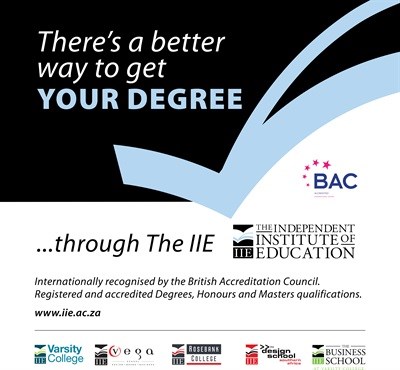
Related
Top stories



Marketing & MediaAds are coming to AI. Does that really have to be such a bad thing?
Ilayaraja Subramanian 6 hours



More news


















The situation is unlikely to change any time soon, and universities will for the foreseeable future continue to accept only a fraction of applications. However, that does not mean affected matriculants have to give up on the dreams they had for their futures, and settle for a different line of work completely, an education expert says.
“There are many thousands of learners with exceptional results who did not land a space at a public university,” says Dr Felicity Coughlan, Director of The Independent Institute of Education, SA’s largest private higher education provider.
“Telling such a person, who has qualified for degree entry but not gained access to the public sector that they should consider a Technical and Vocational Training college, is a very confusing message and does not reflect all the options available which may in fact still make degree study possible,” says Coughlan.
She says while there is no doubt that South Africa needs more vocationally skilled people and that there should be growth in this sector, telling someone who wanted to pursue a degree in commerce or law to rather pursue a technical qualification is not the best or most helpful advice.
“While it is also true that our current societal messaging tells young people that degrees are the only aspiration of any value - which undermines the required growth in status of the TVET sector – the needs and ability of the individual must be taken into consideration, and there can’t simply be a blanket re-routing to technical training.”
Coughlan says if a prospective student is very clear about their chosen field of study, telling them to consider a TVET because of full universities does not recognise the intense frustration and disappointment of that person.
“Not gaining access does not mean a prospective student would not have excelled in a university type environment. Students who would have gained access just a handful of years ago on the same performance, now are not able to do so because of high demand and limited spaces.”
Coughlan says the advice currently being provided to these young people ignores the fact that their degree dreams can still become reality at the close to 120 registered private higher education institutions across the country – institutions which are subject to the same oversight as public universities, and whose qualifications are highly respected in the workplace.
“Many of these higher education institutions, which by law may not call themselves private universities, offer high quality degrees and are accessible to students who did not get in to the public sector institution of their choice.
“Furthermore, prospective students are increasingly opting for private higher education by choice – because of throughput rates and small class sizes among other factors – so the perception that one only goes the private route if one’s results were not good enough to secure a space at a public university no longer holds.”
Coughlan points out that at credible private higher education institutions, one can study anything from professional accounting to business management, communication and law to education and computer science, as well as several exciting niche qualifications such as branding or game development at degree level.
“For almost two decades now SA has had a unitary quality assurance system for the accreditation of higher education institutions in both the public and private sector, and it is only an artifice of law that prevents private institutions calling themselves private universities. This continues, even though private higher education institutions produce thousands of top graduates every year, and even though they are able to confer degrees and qualifications all the way to doctoral level.”
Coughlan says that although quality at private higher education institutions varies just as it does between public universities, matriculants are done a great disservice if they are told that their only options are public universities or technical training.
“If a degree is what someone wants, provided it is for the right reasons and not simply to ‘get a degree’, then the fact that the public sector institutions are full need not and simply should not be seen as the end of the road.”